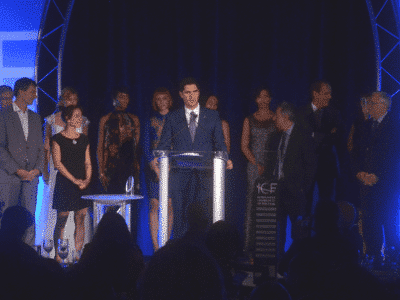Eight Canadian communities selected for Intelligent Community Forum’s Smart21

 The Intelligent Community Forum, a New York-based think tank and foundation that studies and promotes best practices for the improvement of urban life, has selected eight Canadian cities among its overall finalist list for its Smart21 Communities of 2016.
The Intelligent Community Forum, a New York-based think tank and foundation that studies and promotes best practices for the improvement of urban life, has selected eight Canadian cities among its overall finalist list for its Smart21 Communities of 2016.
Following a one-day convention in Dublin, Ohio, this announcement launches the creation of a newly formed Dublin Institute, which is meant to act as a collaboration between public and private sector leaders, as well as universities and research institutions.
“We are very excited to name 11 new communities from North America, Europe and Asia to this year’s Smart21,” said ICF co-founder Robert Bell. “We streamlined our selection process this year, increasing the quantitative portion of the data-gathering and analysis, and that has created opportunities for more cities and counties to be included in consideration for this prestigious group of Smart21 Communities.”
The ICF’s guidelines for selection are outlined by their theme for this year, From Revolution to Renaissance, which underlines the need to for communities to react proactively to the challenge presented by worldwide disruption, both out of economic necessity and for innovation’s sake.
Criteria used to evaluate communities for intelligence fell into six categories.
1) Broadband, regarded by the ICF as the next essential utility, the same as water and roads.
2) Knowledge Workforce, which they define as workers who specialize in a particular field of knowledge that are unlikely to be replaced by either robots or software in the future.
3) Innovation, regarded as the degree of collaboration between workers in the knowledge economy and the business community, government officials and institutions such as universities or hospitals.
4) Digital Equality, or access to broadband and technology, regardless of class, race, age, ability or level of education.
5) Sustainability, or the building out of current infrastructure, business practices and citizen’s lifestyles with an eye to the future.
6) Advocacy, or the willingness of the establishment to embrace the onrush of change.
Last year, the ICF’s model was its model was recognized by the U.S. Department of Commerce under the Workforce Innovation and Opportunity Act, which on behalf of the American government “aimed at creating a more flexible and responsive system of workforce development to meet the needs of employers looking to fill 21st century jobs.”
Despite that, only two American communities, San Diego and Marlborough, Massachusetts, were selected for the Smart21, while eight Canadian communities made the cut.
Finalists will be further narrowed down to a collection of seven on February 10, 2016 before a final selection of Intelligent Community of the Year is made at an event in Columbus, Ohio in June 2016.
| Community | Country | Population |
| Armidale, New South Wales | Australia | 25,327 |
| Brabantse Kempen Region | The Netherlands | 108,000 |
| Hamilton, Ontario | Canada | 520,000 |
| Hsinchu County | Taiwan | 540,193 |
| Ipswich, Queensland | Australia | 190,000 |
| Jönköping | Sweden | 132,000 |
| Kaohsiung | Taiwan | 2,770,000 |
| Lambton County, Ontario | Canada | 129,479 |
| Lethbridge, Alberta | Canada | 94,804 |
| Marlborough, Massachusetts | USA | 39,612 |
| Montreal, Quebec | Canada | 1,988,243 |
| Mülheim an der Ruhr | Germany | 169,398 |
| New Taipei City | Taiwan | 3,966,533 |
| Oshawa, Ontario | Canada | 160,051 |
| Ottawa, Ontario | Canada | 1,096,100 |
| San Diego, California | USA | 1,381,069 |
| Surrey, British Columbia | Canada | 514,390 |
| Taitung County | Taiwan | 224,470 |
| Taoyuan | Taiwan | 2,061,501 |
| Whanganui | New Zealand | 43,100 |
| Winnipeg, Manitoba | Canada | 782,640 |

Terry Dawes
Writer


